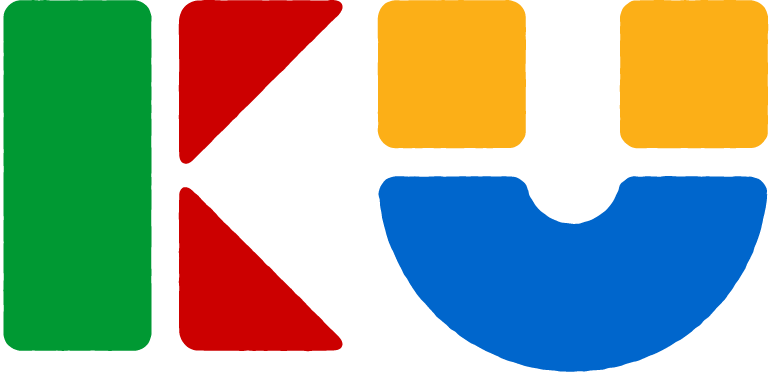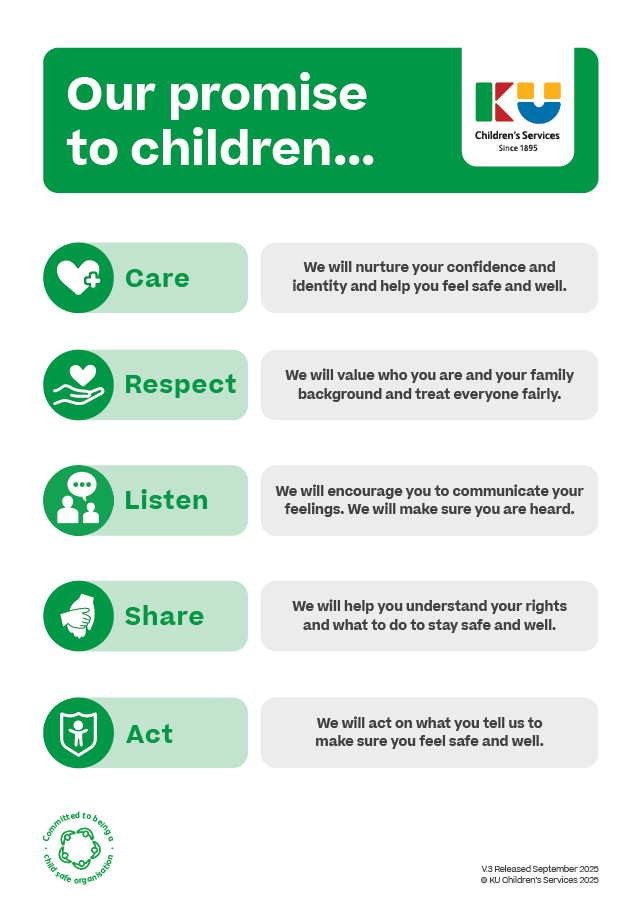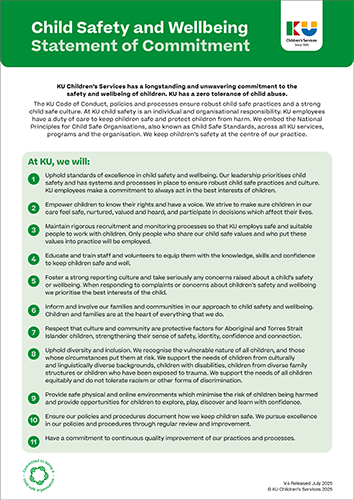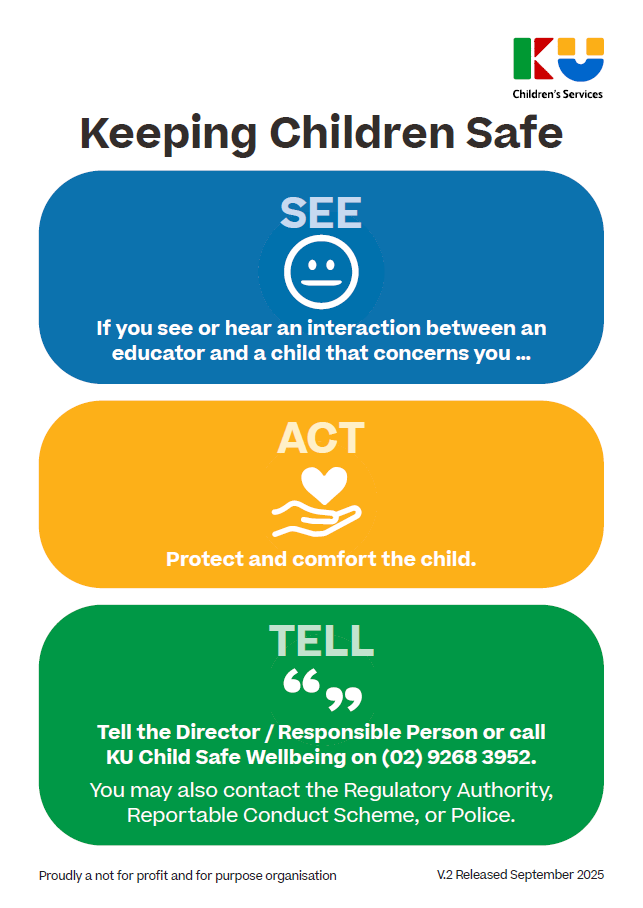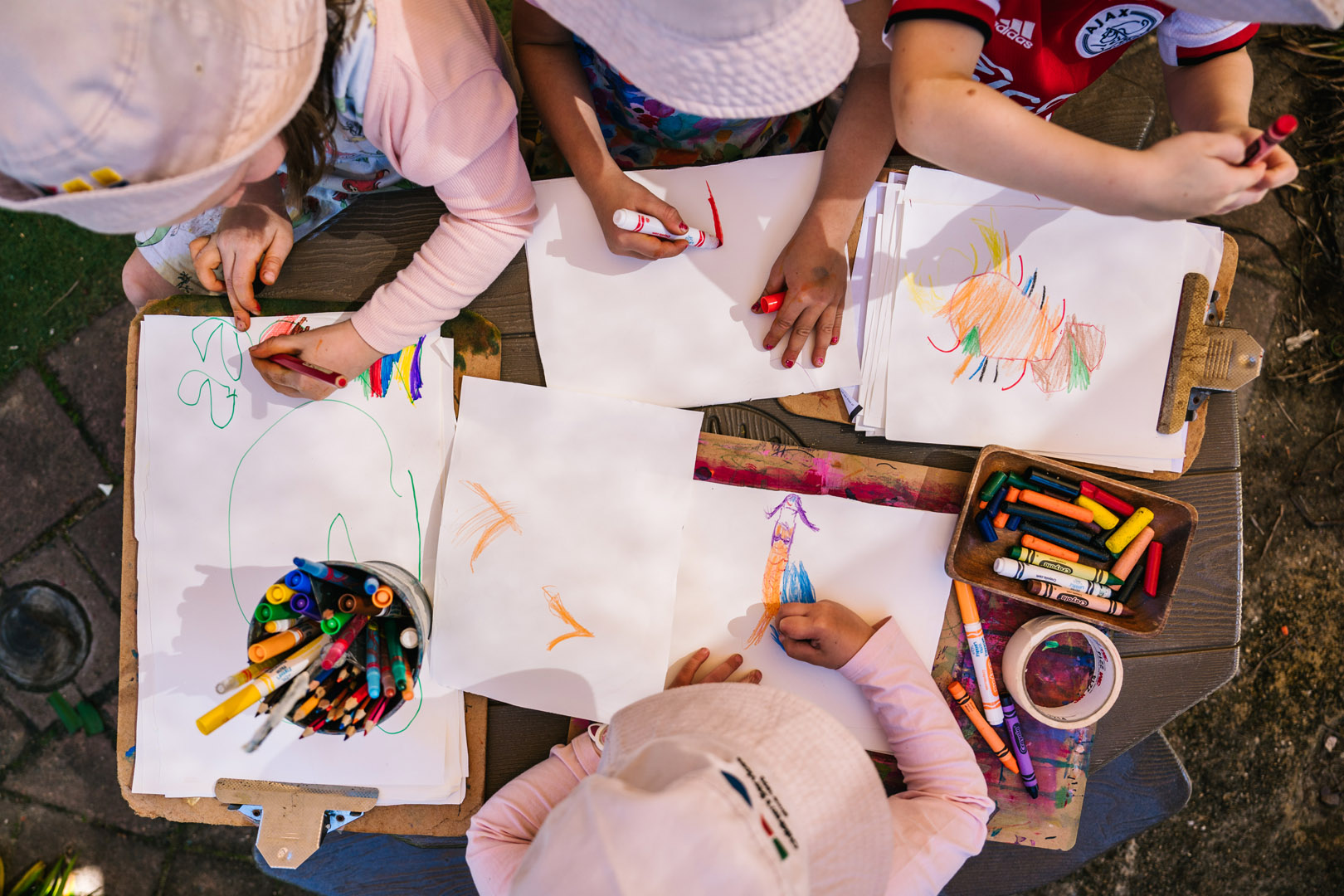
Child Safe Commitment
KU has a longstanding and unwavering commitment to the safety and wellbeing of children. Learn more about our Child Safe Commitment.
KU's commitment to child safety
KU has a longstanding and unwavering commitment to the safety and wellbeing of children. We uphold standards of excellence in child safety and prioritise children’s safety and wellbeing. KU has a zero tolerance of abuse or harm to children.
The KU Code of Conduct, policies and processes ensure robust child safe practices and a strong child safe culture.
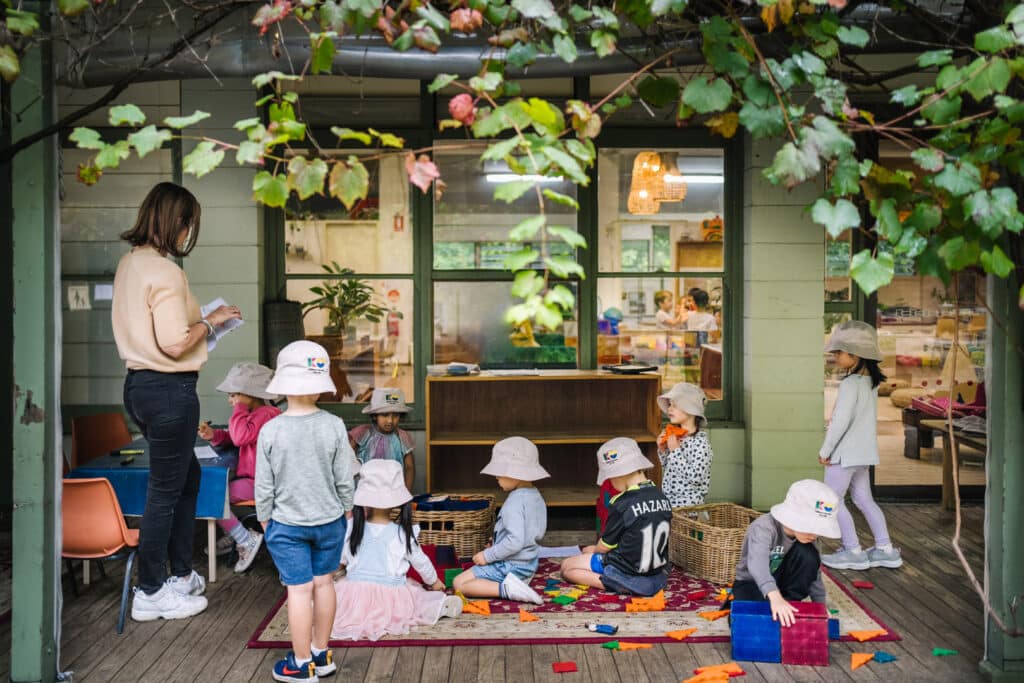
At KU, child safety is an individual and organisational responsibility. KU employees have a duty of care to keep children safe and protect children from harm. We embed the National Principles for Child Safe Organisations, also known as the Child Safe Standards, across all KU services, programs and the organisation.
We keep children’s safety at the centre of our practice.
How we keep children safe
Role of the KU Child Safe and Wellbeing team
KU has a strong child safe culture and a dedicated Child Safe and Wellbeing team who report directly to the CEO. This experienced team guides and oversights the embedding of child safe practice across the organisation, as well as conducting investigations into any concern raised about an educator’s interaction with a child.
KU promotes a reporting culture, and we take seriously any concern raised by a child, parent, visitor or staff member. Our ‘See Act Tell’ poster is prominently displayed throughout our services and programs, reinforcing our reporting culture.
If you have concerns about a staff member’s interaction with a child or a child safe concern, please speak to the KU service or program or the KU Child Safe and Wellbeing team on 02 9268 3952.
Management oversight
KU Education & Quality Managers and Program Managers monitor services and programs to ensure child safe practices are implemented and reviewed.
Any child safe matter is reported to and investigated by the KU Child Safe and Wellbeing team.
Recruiting the right staff
KU’s recruitment processes have a strong child safe focus – from initial advertising to induction and beyond.
Applicants are required to demonstrate an understanding of child safe practices, mandatory reporter responsibilities and a genuine commitment to children’s safety and wellbeing in an interview to be able to move to the next stage of the recruitment process.
Pre-employment screening and referee checks ask explicit questions about the applicant’s employment history, including if any concerns have been raised about the applicant’s interactions with children.
All staff have a current and verified Working with Children Check (WWCC), but we understand that the WWCC cannot be relied on in isolation. Staff are aware of their responsibility to never be alone with a child and always be in sight of a co-worker. Our Code of Conduct requires staff to notify KU Child Safe and Wellbeing if they see any concerning interaction.
Our staff know that abusers often test boundaries to see what they can get away with and at KU we will immediately take action to ensure the safety of children.
Staff have the skills, knowledge and confidence to keep children safe
At KU, all staff attend Child Safe and Wellbeing training as part of their induction and then a compulsory refresher training every 12 – 24 months.
This training unpacks the KU Child Safe Code of Conduct and KU’s three main Child Safe Policies (Child Safe, Child Protection and Child Safeguarding). It covers all key child safe skills including recognising grooming behaviours, identifying inappropriate interactions and the crossing of professional boundaries, child safe reporting processes and expectations, supporting children during disclosures of abuse, child protection and mandatory reporter training.
KU staff also complete the Child Safe Code of Conduct eLearning module and re-sign their Child Safe Code of Conduct Agreement annually. The Code identifies inappropriate / unacceptable interactions and reinforces KU’s expectations that interactions with children are respectful, warm and caring.
Supervision of children
At KU, we have a minimum of two staff working with each group of children at our services. Adults working with children are always in line of sight of each other.
We understand there are some situations in which a child’s needs may necessitate extra supervision measures. For example, some services may require additional staffing to ensure two staff are available to support a child requiring medical procedures or to respond to a behaviour support emergency.
Each service and program has a Supervision Plan which guides staff placement, ensuring line of sight is maintained between staff working with children. As a teacher or educator moves around the care environment, co-workers reposition to ensure they are in sight of each other, including when a teacher or educator supports a child in the bathroom or changes a nappy. Cot room viewing windows are never obscured and co-workers regularly check when children are being settled for sleep.
Staff are not permitted to take children to offices, storerooms, sheds or to leave designated learning spaces with children. Students and visitors are supervised by KU staff.
Managing child safe risks at the service
Each KU service and program has a Child Safe Risk Management Plan that identifies practical strategies to address any potential child safe risk in the physical and online environment.
Staff critically reflect on prioritising child safety when planning indoor and outdoor learning environments, setting up equipment, choosing resources and when planning special events.
Protecting children’s images
There are some risks which are addressed by overarching KU policies and processes. One potential risk is an adult working with children taking an inappropriate photo of a child.
At KU, staff are not permitted to have their personal devices on them when they are working with children, and teachers and educators can only take photographs of children on KU devices.
KU was an early adopter of the voluntary National Model Code which was proposed to prevent abusers from being able to record abuse of children on their own devices.
Visitors are not permitted to use personal electronic devices to photograph, video or record children when at the service. Family members who attend for purposes other than drop off and pick up are considered visitors and are expected not to use personal devices in the service environment.
We empower children – children are the boss of their body
Teaching children personal safety messages and encouraging children to speak up helps to keep children safe.
KU has a child rights approach. We encourage children to have a voice and let them know we are listening and value their ideas and opinions. Children are reminded teachers and educators are there to make sure they are safe and to tell an educator if they feel sad or frightened.
KU staff use a range of children’s books and resources to teach personal safety messages, including the NSW SAFE series, Victorian Kids Roar and the Educate2Empower resources. These age-appropriate resources teach children simple child safe messages such as the Undies Rule.
At KU, children are regularly reminded about personal safety messages, and teachers and educators begin teaching the concept of consent from a very young age. We respect children’s right to say no and to make choices. We tell children they are the boss of their body and always ask a child before assisting with a personal care routine, such as putting on sunblock or wiping a nose or bottom.
Research supports that young children are safer when they use anatomically correct names for private body parts and understand that no one can ask to look, touch or see a private body part. KU families are encouraged to ask to see the SAFE series books or other resources to support having personal safety conversations at home.
The online environment has a range of risks for young children. KU teachers and educators use resources from the eSafety Commissioner early years program to teach children age-appropriate online safety messages. KU services only use KU IT approved apps and children are always supervised when online.
KU values male role models in early childhood education
KU values the important role men play in the lives of children and believe they make a valuable contribution to the education and care of young children.
We understand that parents may be heightened about male teachers and educators given the recent incidents of the abuse of children in early learning environments. The abhorrent behaviour of these individuals has been devastating for so many.
KU is asking the KU community to focus on the behaviour rather than the gender of the perpetrator. That abuse was able to occur shows a failure in child safe systems and reminds everyone in the early childhood education and care sector that we have an individual and collective responsibility to keep children safe.
KU’s strong child safe culture
At KU, we remain vigilant in safeguarding children and having robust child safe practices. All KU staff have made a commitment to keep children’s safety and wellbeing at the centre of their practice.
If you would like more information about KU’s child safe practices, we encourage you to read our child safe policies and Statement of Commitment to Being a Child Safe Organisation, and speak with the staff at the KU service or program you are considering for your child.
